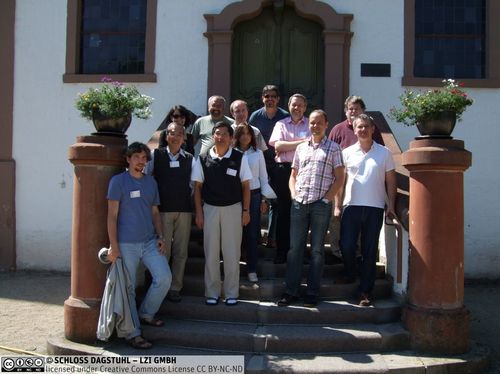Dagstuhl-Seminar 08301
Group Testing in the Life Sciences
( 20. Jul – 25. Jul, 2008 )
Permalink
Organisatoren
- Alexander Schliep (MPI für Molekulare Genetik - Berlin, DE)
- M. Amin Shokrollahi (EPFL - Lausanne, CH)
- Nicolas Thierry-Mieg (TIMC-IMAG, CNRS - La Tronche, FR)
Kontakt
Group testing AKA smart-pooling is a general strategy for minimizing the number of tests necessary for identifying positives among a large collection of items. It has the potential to efficiently identify and correct for experimental errors (false-positives and false-negatives). It can be used whenever tests can detect the presence of a positive in a group (or pool) of items, provided that positives are rare. Group testing has numerous applications in the life sciences, such as physical mapping, interactome mapping, drug-resistance screening or designing DNA-microarrays, and many connections to computer science, mathematics and communications, from error-correcting codes to combinatorial design theory and to statistics. The goal of the seminar is to bring together researchers representing the different communities working on group testing and experimentalists from the life sciences. We plan to address the following topics:
- Generalized group testing, where the choice of pools is constrained
- The decoding problem of inferring positives from the pool outcomes, to try to reconcile the stochastic and combinatorial formulations
- The real-world design problem of assigning items to pools, where the focus is on average-case performance rather than worst-case
- Applications in the life sciences, taking into account application-specific constraints on the design and decoding problems
The desired outcome of the seminar is a better understanding of the requirements for and the possibilities of group testing in the life sciences. Computer scientists should gain an increased understanding of the constraints imposed by the realities of wet lab experiments and the novel theoretical challenges arising from them. Biologists should obtain a clear view of the various smart-pooling methods and solutions that are available
- Rudolf Ahlswede (Universität Bielefeld, DE)
- Tim Beißbarth (DKFZ - Heidelberg, DE)
- Ferdinando Cicalese (University of Salerno, IT)
- Peter Damaschke (Chalmers UT - Göteborg, SE) [dblp]
- Annalisa De Bonis (University of Salerno, IT)
- Friedrich Eisenbrand (EPFL - Lausanne, CH) [dblp]
- Hung-Lin Fu (National Chiao-Tung University - Hsinchu, TW)
- Masakazu Jimbo (Nagoya University, JP)
- Simon Litsyn (Tel Aviv University, IL)
- Olgica Milenkovic (University of Illinois - Urbana Champaign, US) [dblp]
- Frank Schaarschmidt (Leibniz Universität Hannover, DE)
- Alexander Schliep (MPI für Molekulare Genetik - Berlin, DE) [dblp]
- M. Amin Shokrollahi (EPFL - Lausanne, CH) [dblp]
- Nicolas Thierry-Mieg (TIMC-IMAG, CNRS - La Tronche, FR)
- Eberhard Triesch (RWTH Aachen, DE)
Klassifikation
- interdisciplinary: life sciences and molecular biology
Schlagworte
- Group Testing
- Pooling
- Combinatorics
- Design Theory
- Error correcting


